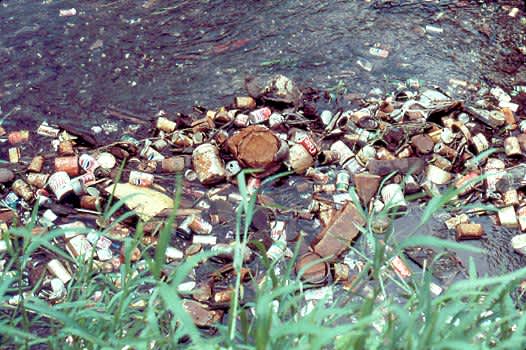Time to Pitch In and Help Clean Up the Woods
James Swan 10.27.14

In 2013 all federal spending for domestic land, water, ocean, fish, and wildlife programs constituted 1.02 percent of the federal budget, half the percentage of what it was two decades ago. These budget cuts left some wildlands management agencies with little funds. Consequently some efforts are being made to try transfer federal lands to states, or even private interests. The Rocky Mountain Elk Foundation and other conservation groups are opposed to this transfer. Part of their concern is that many state conservation agencies are already underfunded, and if wildlands are placed in private ownership then access can become a problem. A recent poll of voters in Western states found that most of them also oppose such a transfer.
Regardless of who owns the ;amds, without proper support natural areas can become the location for many things that people do not want to have around their homes, rather than a place to recreate that supplies many valuable renewable resources and supports wildlife conservation.
One serious problem associated with these budget cuts is that there are not enough agency employees to adequately manage them, especially law enforcement officers—federal and state forest rangers and game wardens, who are the primary people responsible for patrolling and enforcing laws on public wildlands. There are less than 8,000 federal and state wildlife law enforcement officers for all of North America. Contrast this with the City of Chicago, which has 12,000 police officers, or New York City, which has a police force of 35,000.
I didn’t become fully aware of some of the extent of problems created by budget shortages for wildlands until filming a documentary on California’s game wardens. Illegal marijuana gardens on public wildlands have been getting a lot of press recently, and it is a very serious problem, but that’s just one problem of many. Following wardens on patrol, we found garbage dumps, discarded gear, miles of irrigation pipes, homeless people, remains of poached animals, toxic chemicals, illegal mines, illegal marijuana grows, and, of course, many law-abiding sportsmen. The damage going on is not just to natural beauty, but to water conservation, wildlife habitat, wildlife conservation, and public safety. Some of the problems are a result of inadequate social services, or even the legal system, but the bottom line is that the woods are being used for things that should not be happening there and we all will end up paying for it one way or another—fires, wildlife populations declining, natural beauty being destroyed, decreased recreational opportunities, and so on.
My experience in California led to my talking with game wardens from other states. Outdoorsmen and should consider ways to pitch in and help.
Why not contact your local game wardens and/or state and federal agencies and ask if they need help? You might also ask your local game wardens about riding along with them on patrol, or inviting them to come to your groups and give a talk about what’s going on.
Fishing and hunting are now peaking all across the United States, but as temperatures drop the woods will become quiet. That’s a time for outdoor sportsmen and conservation groups to get together, share stories, and take on some volunteer projects.
Hunter education instructors all are volunteers and hunting would not be so safe without them. They set an example of what is possible. For all sportsmen and sportswomen, know that if you encounter illegal activities going on wildlands, report them. There are wildland law enforcement hotlines in every state that will give you a reward if your tip results in an arrest and conviction. There is also a national hotline for the Fish and Wildlife Service.
Always pick up trash when you find it. Repairing and building trails and helping with maintenance in general are always helpful. Many states and federal agencies welcome volunteers to help with research and visitor service. Checking for limits and size of fish, what many people see game wardens as spending their days doing, becomes a secondary task as wardens encounter more serious problems. When wardens have to spend time policing all kinds of things, they simply do not have the resources to do things like clean up trash, which can cost between $10,000 and $15,000 per acre. In most states, there’s a backlog of what needs to be done. A lot of it simply involves collecting trash and hauling it away. It’s not very glamorous, but essential.
Sportsmen already know the value of wildlands and they can lead the way to insure that more people appreciate wildlands and the importance of conserving them for all of us. The more people there are in the woods who care, the more people that will support conservation and protection of public wildlands.

